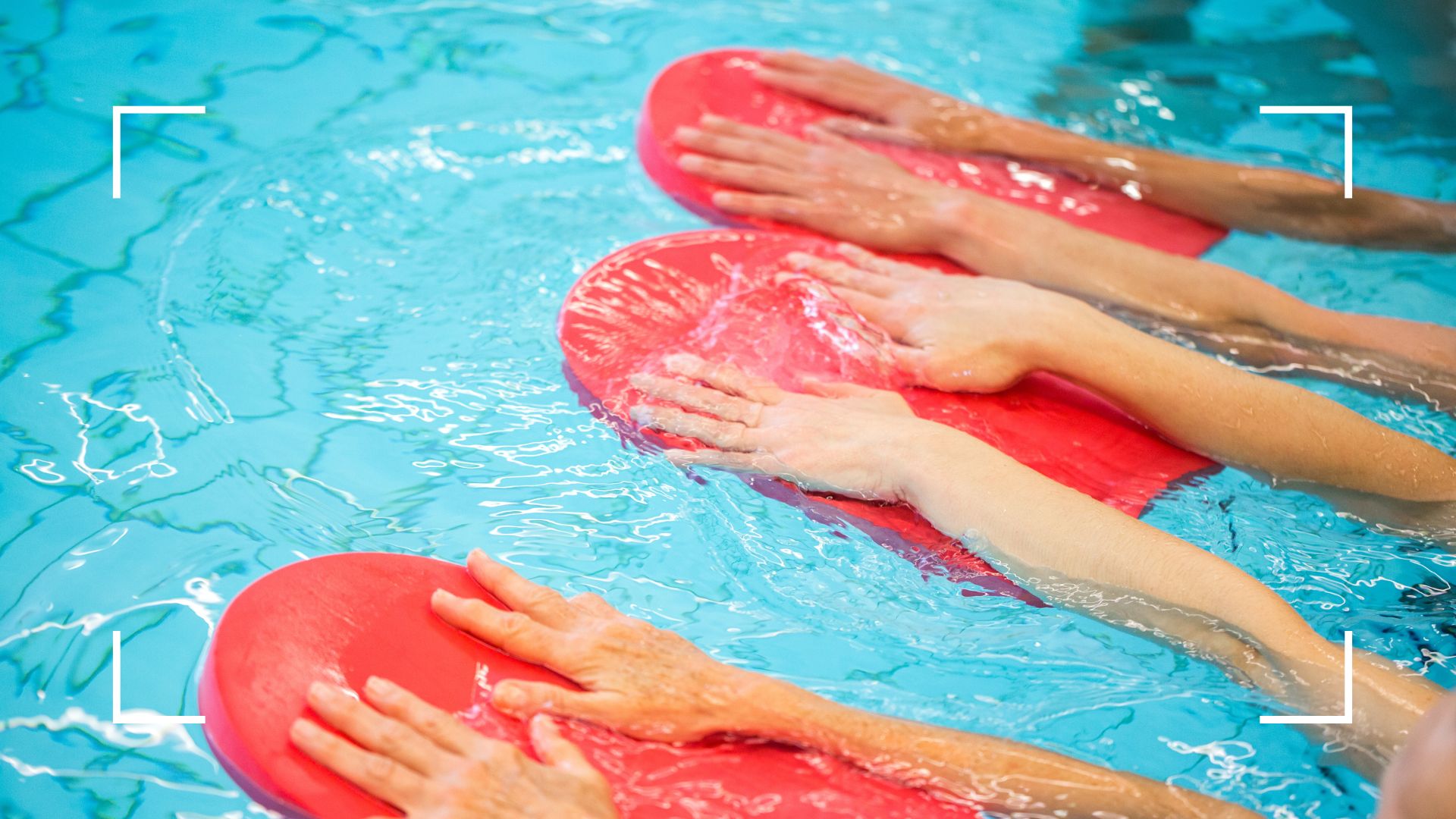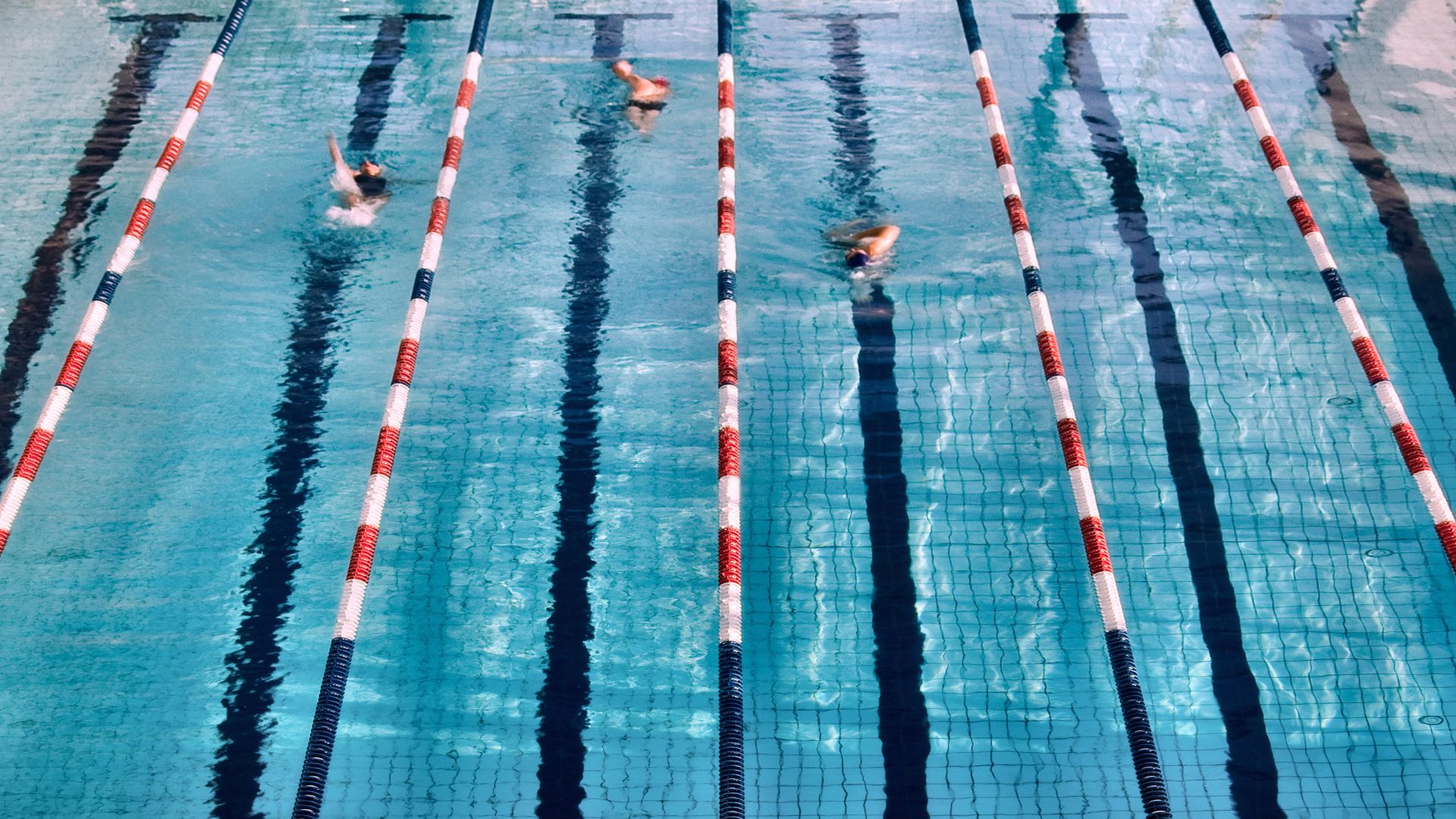How many calories does swimming burn?
Personal trainer reveals how many calories swimming burns and the best strokes to use, plus why it's so good for weight loss


Wondering how many calories does swimming burn? There are plenty of reasons to go for a swim that have nothing to do with calories or weight loss, but if you are looking to know the stats behind your dip, we have you covered.
Much like running, walking, and cycling, swimming is one of the best cardiovascular exercises. There are so many benefits of swimming for our bodies - and minds - like improving fitness levels, easing the impact on the bones and joints, and even building muscle. Because of all this, it's also a great exercise for anyone who wants to lose weight.
"Swimming can be a great addition to a well-rounded exercise routine that includes a combination of cardiovascular exercises, strength training, and flexibility work," agrees Amanda Place, an award-winning person trainer. "As with any exercise program, it's essential to maintain consistency, gradually increase the intensity, and complement your workouts with a balanced diet to achieve sustainable weight loss."
She says, "Swimming at a moderate speed can burn over 500 calories an hour, making it an effective way to burn a significant number of calories, while enjoying a refreshing and low-impact workout." However, the trainer also notes that calorie burn is highly individual. The number of calories one person burns won't be the same as the other. With this in mind, we have a closer look at how many calories swimming burns for individuals.
How many calories does swimming burn?
Calorie burn is a high-individual calculation, mainly based on your current weight. Research by Harvard University suggests that in 30 minutes of general swimming:
- Someone weighing 125-pound (56kg) may burn 180 calories
- Someone weighing 155 pounds (70kg) may burn 216 calories
- Someone weighing 185 pounds (85kg) may burn 252 calories
Turning up the intensity, i.e. speed and vigor, of the swim will naturally mean you burn more calories. For example, the same Harvard research suggests that in 30 minutes of swimming laps around a pool vigorously:
- Someone weighing 125-pound (56kg) may burn 300 calories
- Someone weighing 155 pounds (70kg) may burn 360 calories
- Someone weighing 185 pounds (85kg) may burn 420 calories
If you, like me, sit between these weight figures then it may be an approximate figure between the upper and lower numbers. One way to get a better understanding of how your body burns calories, without having to do the maths yourself, is by investing in a fitness tracker like one of the best Fitbits. While no smartwatch is entirely accurate when it comes to tracking calorie burn, it'll put you in the right ballpark.
Sign up for the woman&home newsletter
Sign up to our free daily email for the latest royal and entertainment news, interesting opinion, expert advice on styling and beauty trends, and no-nonsense guides to the health and wellness questions you want answered.
There are actually several factors that determine how many calories you burn swimming though, explains Place, who is also the founder of Sculptrition. These are the most important ones to consider:
Factors that play into how many calories you'll burn swimming
- The intensity of your swim: As noted, swimming vigorously burns a lot more calories than swimming leisurely. "The more effort you put into your swim, the more calories you are likely to burn," says Place, who is also the founder of Sculptrition.
- Body weight: The role that your current body weight plays in how efficiently you burn calories shouldn't be undervalued, says the trainer. "Generally, a heavier person burns more calories than a lighter person when performing the same activity because it requires more energy to move a larger body mass."
- Swim stroke: "Different strokes require varying levels of effort and engage different muscle groups. For instance, an intense freestyle or butterfly stroke tends to burn more calories compared to a relaxed breaststroke or backstroke," she says.
- Technique: But it's not all about how fast you go. "Efficiency in your technique, including proper body alignment, stroke mechanics, and breathing, can also affect the overall energy expenditure during swimming."
- Duration: Naturally, if you swim for longer (even at a slower pace), you'll eventually burn more calories. If you're looking to burn more calories in a limited time, you'll need to increase the intensity of your swimming.
- Individual factors: Ultimately, how quickly someone will burn calories comes down to some very individual factors - some of which are outside of our control. "Each individual's metabolic rate and fitness level can impact the calorie burn during swimming," says Place. "Metabolic rate refers to the rate at which your body burns calories at rest. Individuals with higher metabolic rates tend to burn more calories overall, including during exercise. Fitness level influences also the efficiency of your body's energy utilization and can impact the intensity at which you can swim."

Is swimming a good way to lose weight?
Yes, swimming can be an excellent exercise to incorporate into your routine if you're looking to learn how to lose weight without dieting excessively. "Swimming engages multiple muscle groups throughout the body, making it a fantastic full-body workout," explains Place. "The resistance provided by the water requires you to use your arms, legs, core, and back muscles, leading to increased calorie burning and improved muscle tone. This comprehensive engagement of muscles helps in burning fat and promoting overall weight loss."
Plus, doing swimming as a workout for beginners is suitable for all fitness levels. This is where swimming often wins out in the swimming vs running debate. "Swimming's low-impact nature makes it an excellent workout of choice if you have joint issues or if you prefer a workout that is gentle on your body," she says. "The water's buoyancy reduces the impact on your joints while still providing an effective cardiovascular workout. It also allows for a wide range of motion without subjecting your joints to the same level of strain as activities like running or high-impact aerobics."
And, as we've seen, it burns lots of calories. "Swimming is a form of cardiovascular exercise that elevates your heart rate and increases your metabolic rate. This leads to the burning of calories and helps create a calorie deficit, which is essential for weight loss," says Place.
How to burn more calories swimming
- Increase the intensity of your swim: "You can achieve this by incorporating interval training or high-intensity bursts into your swimming routine," explains Place. "Alternate between periods of faster, more vigorous swimming, and active recovery or slower-paced laps. This interval-style training can elevate your heart rate and maximize calorie expenditure."
- Use different strokes: "Varying your swim strokes can engage different muscle groups and increase the overall energy expenditure. Each swimming stroke has its own demands and challenges, so incorporating a mix of strokes like freestyle, backstroke, breaststroke, and butterfly can provide a more comprehensive workout," she says. "This variation helps target different muscles and keeps your body engaged, leading to increased calorie burn."
- Add in some water-based resistance exercises: "These exercises, such as water jogging, treading water, or using resistance equipment like water dumbbells, can further challenge your muscles and increase the overall intensity of your swim workout. They provide added resistance, making your body work harder and burn more calories."
- Swim for longer: Naturally, the longer you swim for, the more calories you'll burn. "Gradually increase the length of your swim workouts as your fitness level improves," suggests the trainer. "Aim to swim for longer periods, gradually building up to more challenging distances or time frames. This sustained effort helps in burning more calories during your swim sessions."
- But make sure to maintain a good technique: "Focus on maintaining good body alignment, engaging core muscles, and employing proper stroke mechanics. This allows you to move through the water with less drag and greater efficiency, enabling you to swim faster and expend more energy."

Grace Walsh is woman&home's Health Channel Editor, working across the areas of fitness, nutrition, sleep, mental health, relationships, and sex. She is also a qualified fitness instructor. In 2025, she will be taking on her third marathon in Brighton, completing her first ultra marathon, and qualifying as a certified personal trainer and nutrition coach.
A digital journalist with over seven years experience as a writer and editor for UK publications, Grace has covered (almost) everything in the world of health and wellbeing with bylines in Cosmopolitan, Red, The i Paper, GoodtoKnow, and more.
-
 The most decade defining royal moments of the 80s - from Princess Diana fever, royal births and Queen Elizabeth II's historic firsts
The most decade defining royal moments of the 80s - from Princess Diana fever, royal births and Queen Elizabeth II's historic firstsA lot happened in the 80s, and we don't just mean leg warmers and the rise of Madonna
By Jack Slater
-
 Celebrities who have spoken openly about menopause - and what they had to say
Celebrities who have spoken openly about menopause - and what they had to sayCelebrities such as Oprah Winfrey and Jennifer Aniston have helped combat the 'taboo' of talking about menopause in the public eye
By Grace Walsh